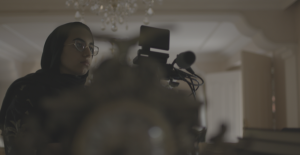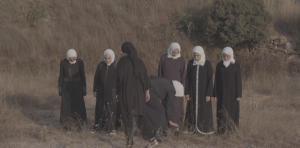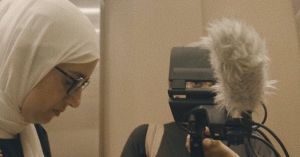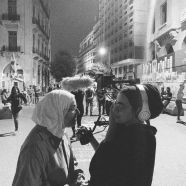A Faith Journey in Film: An Interview with Jude Chehab
Lebanese American filmmaker Jude Chehab says the main purpose of her debut documentary feature Q, which premiered at New York’s Tribeca Film Festival earlier this year, was to save her mother. “That was really the intention. I never was thinking about, how am I going to change in the making of this film? It always felt like it was a film about her and this journey that she’s going on,” she says. “It is the story of me trying to bring my mother to awareness.”

Q is about Al Qubaysiat, a secretive matriarchal Muslim group that originated in Syria, but the focus of the film is not on the group itself. Jude, at age twenty-eight, examines how her mother Hiba starts to lose a part of herself because of her adherence to this strict order. Through interviews with her mother, grandmother, and father, as well as footage of the group’s meetings, Jude unravels the effect the Qubaysiat has had on her family.
Jude’s father Ziad had left Beirut at age seventeen during the Lebanese civil war (1975–1990) to settle in the US. Jude and her two siblings grew up in Tallahassee, Florida, where their parents earned their doctorate degrees. However, they had always planned to move back to Lebanon at some point. After Jude’s maternal grandfather passed away and for various other reasons, the family decided it was time to be closer to home.
“I was very excited about it. Growing up, we were kind of in the suburbs in Florida. I wanted to feel very Arab. . . . I felt like there were all these gaps in my understanding of myself and where I’m from,” she says.
Jude, now based in New York, lived in Lebanon from age ten to eighteen, returned to the US for film school and work, and then went back to Lebanon for several years at age twenty-three during the making of Q. She was exposed to the Qubaysiat early on—it had been a part of her grandmother’s life, her mother’s life, and now hers.
“I grew up in the group. . . . I genuinely thought that this was everyone’s experience of Islam. I didn’t understand that we were part of something very different,” she says. After her parents enrolled her in a German school, she asked that she attend the group’s school instead. “I wanted to be part of a sisterhood and just feel—after coming from America—a feeling of acceptance and that I can be as Muslim as I want and that’s okay. . . . I also thought it was very ‘feminist’—women teaching women their religion, which I hadn’t seen before.”

At age thirteen, Jude decided to wear the hijab and in an elaborate ceremony akin to a wedding, the revered leader of the group known as “the Anisa” placed the hijab on her hair. In the film, Jude says that she has put on the religious head covering “because I love God” and as a way to proudly display her faith. She has never regretted this choice and continues to wear the hijab, but she slowly started to question the repercussions of allegiance to the Qubaysiat. She describes a culture of threats and fear in the name of love and devotion.
“As I grew older—once I became sixteen, seventeen–I’m reading more, I’m seeing more. I’m also starting to better understand things that are happening. I’m seeing the way my mother is suffering. . . . I’m starting to see that these people are limiting my mother’s potential,” she explains.
Excerpts from a letter to Hiba from the “Grand Anisa” in Syria are telling: “We are followers, not innovators . . . there is no peace with disobedience . . . the one who strays will never arrive.” When the Anisa would enter the room, it “was like the sun entered,” Jude’s grandmother says in the film. Hiba follows that with, “Love is very, very dangerous.”
Jude is hesitant to call the group “a cult,” saying it is “such a heavy word and I think it automatically boxes the film, boxes the group.” She says audiences should not come into the film expecting black-and-white, good-and-evil answers. “There is beauty and there’s pain and those things can exist together.”

There is also nuance in the title itself. At a superficial level, it is an abbreviation of the group’s name, but it is also the Arabic letter Qaf, the name of a surah or chapter in the Quran. The first verse of the surah says simply “Qaf” and, like several Quranic verses that include a single letter, its meaning is a mystery. The second verse, read aloud by Jude’s grandmother in the film, is a warning to those who disbelieve in resurrection and the afterlife—an ominous foreshadowing. Finally, the title refers to Jabal Qaf, a mythological cosmic mountain connecting heaven and earth that, Jude says, is “what I think the heart of the film is . . . this idea of reaching some sort of spiritual enlightenment.”
The making of Q brought Jude some clarity in areas, but more questions in others. “Making the film was like removing veils. . . . Part of that clarity, if anything, has actually made me hold on to the faith with a stronger grasp,” she says. “It was easier to see God without anyone else in the way.”
As for saving her mother, it is more complicated. “I thought the ending is that she would have closure. I was very naïve in thinking that she would have that,” Jude says. “I think the process of releasing the film has given her the awakening in a way. Recently she told me, ‘I think the film is my last letter to the Anisa’—and I think that’s what I wanted this whole time.”
Q has screened in Lebanon, the UK, Armenia, Kosovo, Switzerland, Germany, Italy, the UAE, Scotland, and Canada. It has also screened in several US states, including Vermont, Texas, Maine, Indiana, Oregon, New Hampshire, Arkansas, Ohio, Tennessee, and Louisiana. More information can be found at https://www.qthedocumentary.com.
*All photographs c/o Jude Chehab







